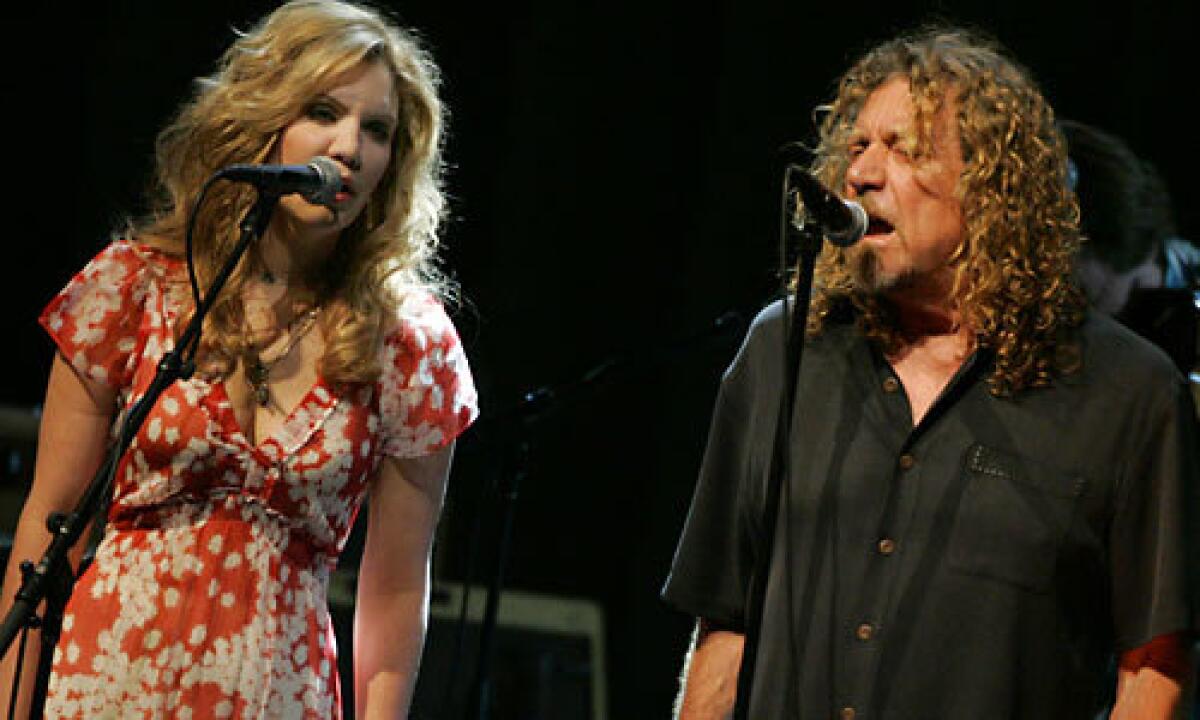Robert Plant and Alison Krauss at the Greek Theatre

- Share via
The genre of pop standards is a bit out of bounds for Robert Plant and Alison Krauss, whose high-profile collaboration excavates a more traditional sector of America’s musical geography. But when the singers and their band came to the Greek Theatre on Monday, there was something of “The Wizard of Oz” about it.
The roles are a little scrambled, but picture Plant as an English rock-star version of Dorothy, a noble, curly-maned lion who has entered the swampy heart of American blues and country after decades of flirting with it from afar, both as the singer of Led Zeppelin and as a solo artist.
The pilgrim is accompanied by a muse of singular voice and vision in country/bluegrass star Krauss, and a tall, eccentric scarecrow who’s actually pulling the strings -- guitarist and bandleader T Bone Burnett, whose selection of songs and musical concepts helped transform what began as a tentative teaming into a fertile enterprise.
It’s one with a broad reach and a cutting edge. “Raising Sand,” their album from last fall, has found critical acclaim and a substantial audience, and on the first of their two nights at the Greek, the outdoor theater was packed with both Americana enthusiasts and weathered rock warriors in vintage Zeppelin T-shirts.
On stage, it all clicked on multiple levels: the back story (two celebrated, not obviously compatible artists get together for purely creative reasons and make a go of it), their distinctive voices, the stories told in the songs, the rapport of the five instrumentalists (six when Krauss played fiddle), the underlying tension of thousands of people hoping that Plant would dust off a Zep classic.
He obliged, if not in conventional form. “Black Dog” was a sly shuffle, the main hook translated into a simple melody played on the banjo by Stuart Duncan. “The Battle of Evermore” was a straightforward duet, and on the bluesy “Black Country Woman” he briefly flashed the old pipes to big cheers.
But the moment that came closest to that legacy was his performance of “Nothin’,” a devastating piece of West Texas existentialism by the late Townes Van Zandt that’s a Plant showcase on “Raising Sand.” The Zeppelinized version at the Greek offered dramatic contrasts between full-blast and near-silence, and Plant’s clenched, cathartic wails drew the biggest ovation of the two-hour show.
Plant’s initiation into the deep mysteries of America’s bedrock music might be the main event in this undertaking, but it’s not all about Bob. The partnership also has ushered Krauss into new terrain, where she’s tapped a darker and more daring current of her artistry.
When she sang Tom Waits and Kathleen Brennan’s “Trampled Rose,” she brought a wail of her own to the table, a feral keening that went straight for the jugular. On Gene Clark’s country lament “Through the Morning, Through the Night,” she distilled the essence of heartbreak and betrayal with an absorbing balance of power and restraint.
If each singer shone individually, their joined voices provided a third major presence. Singing at a lower volume than he does as a rocker, Plant was supple and light, often gliding above Krauss’ rich root notes, but the contrast of his rough-edged timbre and her glass-like tone remained a defining feature.
Most importantly, both seemed to get a kick out of it all, with Plant’s loose but commanding manner setting the tone. They supplemented the “Raising Sand” material with songs cut from similar folk, country, bluegrass and rock ‘n’ roll cloth, such as Ray Charles’ “Leave My Woman Alone,” the Stanley Brothers’ gospel standard “Green Pastures” and Mac Wiseman’s rockabilly-flavored “It’s So Long and Goodbye to You.”
Behind them, Burnett and his musicians, including bassist Dennis Crouch and top-tier guitarist Buddy Miller, crafted a sound that both celebrated and toyed with the conventions of the fundamental forms.
Burnett often played double-time rhythm guitar and added tremolo pulsations that seemed to make the whole sound float in the air, while Jay Bellerose hit the drums with mallets, brushes and fistfuls of maracas, making the beat something that was surrounded and suggested rather than stiffly defined.
It all contributed to the sense of mystery and movement that marked the evening, which ended with Doc and Rosa Lee Watson’s final farewell to a longtime companion, the aptly titled “Your Long Journey.”
“Peace and love,” Plant said, bidding goodnight, but it could as easily have been “There’s no place like home.”
Second-billed Sharon Little flashed a little Plant-style melisma in the bluesy closing song of her set, but overall the newcomer from Philadelphia did a lot of jumping around, showing traces of Lucinda Williams, soul-edged cabaret singer and indie chanteuse.
Little and her songwriting partner Scot Sax, who plays rhythm guitar in her band, show potential on her debut album, “Perfect Time for a Breakdown,” but on stage she seemed a little too cultivated, and her noir-ish material could have used more flavor and dynamism.
richard.cromelin@ latimes.com
More to Read
Sign up for Essential California
The most important California stories and recommendations in your inbox every morning.
You may occasionally receive promotional content from the Los Angeles Times.










